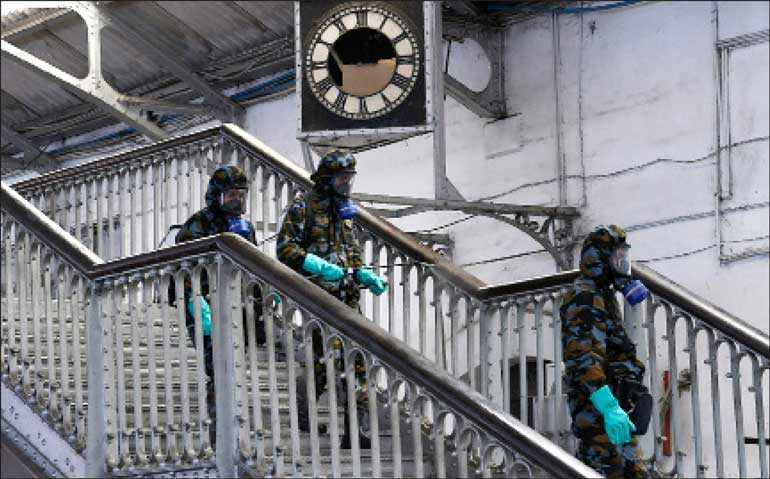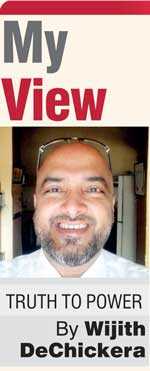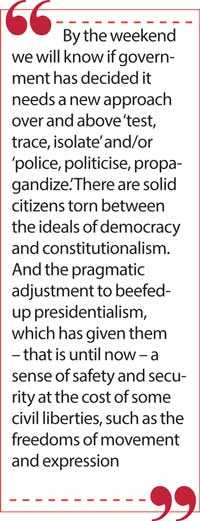Unity, diversity, constitutionality – A triple ‘blessing’ in a thrice-‘blessed’ island-nation?

Incipient setback from a viral enemy – or on the fast track to a political train wreck? – Pic by Shehan Gunasekara
 Friday, 1 May 2020
Friday, 1 May 2020The last month or so has had Sri Lanka united and divided on a broad front of pandemic-related issues. Our nation-state both benefited and was challenged by its unity as well as its diversity. Not to be glib but we were perhaps more hamstrung by our unity.
For instance, there was a quietly desperate acceptance by centre and periphery of a prolonged pseudo-legal curfew. And islanders from all walks of life united under a flag of hardship despite (or because of) our diversity and the DNA of tolerant resilience. May such enlightened self-interest be at peace! Now that the sacrifice of forty days and more has suffered a setback that could have been avoided?
 At the start of a week it seemed like the state and all its stakeholders needed to suspend party-political and other partisan sentiments. And coolly assess the situation – even as the curve slanted upward. The full parabolic graph – first 100 cases in 57 days, second in 19, third in nine, fourth in four and fifth and sixth 100s in just two a-piece – suggested that for all our careful strategy, and blatantly remilitarised management of a crisis (short of summoning Parliament to share the burden), COVID-19 was winning the tug-o’-war at the time of going to press.
At the start of a week it seemed like the state and all its stakeholders needed to suspend party-political and other partisan sentiments. And coolly assess the situation – even as the curve slanted upward. The full parabolic graph – first 100 cases in 57 days, second in 19, third in nine, fourth in four and fifth and sixth 100s in just two a-piece – suggested that for all our careful strategy, and blatantly remilitarised management of a crisis (short of summoning Parliament to share the burden), COVID-19 was winning the tug-o’-war at the time of going to press.Just be careful not to press the martial metaphor too far because some military mandarins may take it more seriously than is good for the health of the republic. For under the rule of regimes entirely grim, public health is conflated with public security. And a people under lockdown are not so much being served as being serviced in time for a return on the investment of state resources.
Ground realities
Also, SARS-Cov-2 is evidently more sensitive to viral rather than political mutations. Additionally, regional variations – South Asia’s relatively low infection and mortality rates (its total infections correspond to the US’s death rate, for e.g.) – may reflect other factors. These could include climatic (heat/humidity) or culinary (spice fortified immune systems). And not only not civic or gubernatorial permutations/combinations, such as a militarised bureaucracy or autocratic leadership.
That locally, our security forces played the roles of containers and carriers of the contagion in a week where the highest number per day was detected (65) and the greatest contingent sequestered (over 3,750) may have dented the administration’s confidence. Moreover, it would no doubt have challenged its hegemony in managing the crisis. And also, hopefully, it would coerce the powers that be to play a more mutually cooperative role rather than take the commanding high road.
By the weekend we will know if government has decided it needs a new approach over and above ‘test, trace, isolate’ and/or ‘police, politicise, propagandize.’ There are solid citizens torn between the ideals of democracy and constitutionalism. And the pragmatic adjustment to beefed-up presidentialism, which has given them – that is until now – a sense of safety and security at the cost of some civil liberties, such as the freedoms of movement and expression.
Unity and diversity
 Be that as it may, civil society has been an active agent in co-opting the instrumentality of a government represented by the executive branch of state alone. While liberals and civil libertarians may choose (uncharitably, maybe?) to interpret this as the populace being cowed down by burgeoning autocracy, perhaps the bigger picture is that civilians have bowed the knee out of pragmatism rather than conviction or compulsion.
Be that as it may, civil society has been an active agent in co-opting the instrumentality of a government represented by the executive branch of state alone. While liberals and civil libertarians may choose (uncharitably, maybe?) to interpret this as the populace being cowed down by burgeoning autocracy, perhaps the bigger picture is that civilians have bowed the knee out of pragmatism rather than conviction or compulsion.But, as in many exercises of their freedom and franchise before, the ballot paper will prove more lasting a testament to public good sense than a curfew pass. And – unless an authoritarian state takes its cue more from Beijing than Brussels, and clamps lockdown for longer than it takes to say ‘disciplined society’ backwards in Mandarin – the polls would come. Even later than sooner – and popular sentiment will show what the people really think of their present governors.
Of course, if the idea that stern governments don’t always know what’s best for their sheep is being challenged on the political front, then let us admit equally that the notion the sheep know their shepherd better is also under scrutiny. If the novel-coronavirus pandemic has proven anything about the nexus between the governed and those who ostensibly lead them, it is that the new world order is up for grabs.
Can it be that in the same way World War II defeated fascism, the Cold War eliminated communism as a contender, and the Great World Bubble Burst of 2007 compromised neoconservative neoliberalism’s claim to be a cornucopia – the present planetary peril will put an end to populism as a stop-gap means for democracies to survive? Is autocracy only a temporary inconvenience to be endured with stoicism – until, say, a vaccine is developed and is commercially available? Or populaces spontaneously develop ‘herd immunity’ and the coronavirus of 2019 (COVID-19) is downgraded to a seasonal flu?
At the moment, the future of government models hangs in the balance in the Sri Lankan mind’s-eye. There are those who claim that strongmen-led governments deliver better. And an honest appraisal of the lot who led us down the road to dusty death in April last year suggests they may have more than some justification. But a stubborn few – purist constitutional lawyers, cosmopolitan twitterati, Colombo liberals, café society, media commentators free of press barons’ agendas – persist in the premise that even results-oriented administrators must tow the line of the country’s supreme law. It is more imperative than ever, now that the laissez-faire tolerance of the people has yielded a dismal result for all the carte blanche given to government.
Also hedging their bets on the commercial fence of ‘wait and see’ are other ivory-tower intellectuals and fantasists who fondly imagine that there’s merit in embracing a strongman in a full-body hug. While cold-shouldering the political machine that props up men and their movements. Heard of symbiosis (mutually dependent benefitting organisms), gents – or the old imperialist maxim ‘divide and conquer’? Let all of you not be found on the wrong side of history by playing Russian roulette with a republic being none too subtly taken apart by a remilitarising regime!
The polls game
There were two ways in which the president could have reconvened parliament. First, by declaring a state of emergency that requires the legislature – still standing at dissolved – to sit again. Or he could have (and still can) recall the gazette notification of 2 March on the house’s dissolution.
If the president does not rescind the dissolution of 2 March, the absolute last date by which parliament must meet is 2 June. Therefore, under the aegis of the present constitution, elections must be held before this. The date now set – 20 June – is not only an ‘unbirthday present’ of a sort, but also a ploy by the election commission, and a cry for help from any litigant brave enough to bell the big cat. But even if the president does bow to public and opposition pressure to recall the assembly of 2015, this parliament’s term would come to an end by 1 September and we’d have to go to the polls by or before 1 December anyway.
That seven opposition parties pledged this week to play ball with the executive – ostensibly in the national interest, but possibly representing a fait accompli by MPs with their eye on the main chance – has placed a new set of cards on the table. Previously, the SLPP saw civil society cum constitutional lawyers’ urging to reconvene a legislature in which the opposition has the superior numbers as a wild card played by former MPs leading lives of quiet desperation under COVID-19. Now, the deck is more evenly balanced. But for all the coercing church, non-state actors and national-minded citizens may do – the dichotomy is this. Either the bid to balance power is a ploy by ex-parliamentarians keen to return to the fray for whatever reason. Or it is an opportunity for the president and his coterie to do what is both politically pragmatic and constitutionally compliant.
And if this route is taken – which is in abeyance at the time of writing – parliamentary elections could be held at any time between 1 September and 1 December; rather than now, in the midst of a skyrocketing SARS-Cov-2 spike in not-so-sunny Sri Lanka.
Ready, Player One? Your long game is not over… yet. Nor need it be. It is a win-win in an impasse that has nation-state, national economy and numberless people in a lose-lose lockdown!
War with viral collateral
Either way (fresh polls or that old parliament returns), the country is committed to going to the polls before the end of the year. If it is to be sooner rather than later, there will be the concomitant battle with COVID-19 to be taken into consideration – over and above frontline fighting along the campaign trail. But that will come together with a resolution to serious public funding challenges, which would be mitigated to a great extent by the re-summoning of parliament. And if for whatever reason polls are to be later rather than sooner, chances are that COVID-19’s curve would have been further flattened – and so do we all hope…
Of import to note at this stage is that there is no such thing as presidential rule under the present constitution. Only a sense since 1978 that parliament must not remain dissolved for more than a quarter of a year. Of course, there is every possibility that as in other historical dispensations in severe distress – e.g. the Weimar Republic of 1931-33, where the Chancellor invoked Clause 48 of the then Germany’s constitution – the executive will move over and above the legislature, to secure the good of the republic. As the exec has done in fact, being adamant – for whatever reason – that those gone are gone for good…
For reasons of health as much as happiness, we can only hope that our incumbent governors will not cross that ‘Schmittian’ line into ‘Ausnamezustand.’ That is, if they haven’t already done so by pointedly ignoring the pleas of public interest lobbies, interpreting the constitution to serve narrower ends than the national, and appointing presidential taskforces in the place of parliamentary oversight.
And if you’re scratching your head and wondering who Carl Schmitt was or where Ausnamezustand may be, join the club of average citizens, who have collectively decided to play stumm and dumb-down their response to the state.
But shots were fired first by would-be autocrats seeking to gag an illegally cowed populace with selective heads on a stick such as a legal eagle who was detained and hasn’t been turned out yet. Don’t say later that you never knew how it would all turn out. Because the writing has been on the wall since a police spokesperson – without fear of contradiction by his elders and executive betters – criminalised the act of criticising government officials.
A silent servitude under prosecutable oppression is simply sowing the seeds of several types of possible future anarchy. And it is a brave regime that presses its case against a trapped beast.
Game over?
